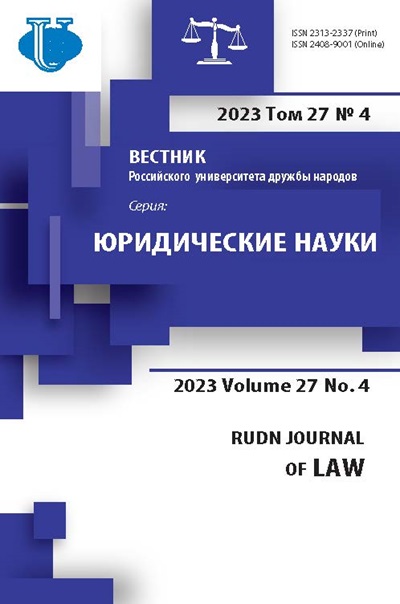Правовая политика в сфере подготовки научных и научно-педагогических кадров вне системы высшего образования
- Авторы: Соколов А.Ю.1, Лакаев О.А.1
-
Учреждения:
- Саратовский филиал Института государства и права Российской академии наук
- Выпуск: Том 27, № 4 (2023)
- Страницы: 886-901
- Раздел: ГОСУДАРСТВО И ПРАВО В СОВРЕМЕННОМ МИРЕ
- URL: https://journals.rudn.ru/law/article/view/36893
- DOI: https://doi.org/10.22363/2313-2337-2023-27-4-886-901
- EDN: https://elibrary.ru/GGPEPF
- ID: 36893
Цитировать
Полный текст
Аннотация
Рассматривается современная правовая политика в сфере подготовки диссертаций на соискание ученой степени кандидата наук вне аспирантуры и ученой степени доктора наук в докторантуре. Актуальность исследования определяется тем, что переход к модели законодательного регулирования докторантуры и подготовки кандидатских диссертаций вне аспирантуры в русле исключительно научной деятельности обусловил отсутствие надлежащей законодательной базы данных направлений функционирования научной сферы, в то время как от надлежащей организации институтов докторантуры и соискательства зависит состояние высшего образования и науки, обеспечение квалифицированными кадрами всех отраслей и сфер функционирования социума. Поставлена цель определить недостатки правовой политики и возможные пути ее совершенствования в указанном направлении. Проанализировано нормативно-правовое регулирование подготовки научных и научно-педагогических кадров вне системы высшего образования, критически оценено его состояние, выявлены перспективы совершенствования институтов докторантуры и соискательства. Использована общенаучная (диалектический метод, анализ, синтез) и частнонаучная методология исследования (формально-юридический, системно-структурный, историко-правовой методы). Обосновывается вывод о необходимости четкого установления прав, обязанностей и условий деятельности докторантов и соискателей на законодательном уровне. Детально определенные гарантии для данных участников научной деятельности должны способствовать повышению востребованности отрасли науки и реализации их творческого потенциала. Нуждается в оптимизации и организация материального стимулирования докторантов и их научных консультантов, которая в настоящее время находится на невысоком уровне, снижая востребованность докторантуры.
Об авторах
Александр Юрьевич Соколов
Саратовский филиал Института государства и права Российской академии наук
Автор, ответственный за переписку.
Email: aysockolov@mail.ru
ORCID iD: 0000-0003-3350-7775
SPIN-код: 4009-2210
доктор юридических наук, профессор, директор
410028, Российская Федерация, г. Саратов, ул. Чернышевского, д. 135Олег Анатольевич Лакаев
Саратовский филиал Института государства и права Российской академии наук
Email: olegoleg81@mail.ru
ORCID iD: 0000-0003-1156-3717
SPIN-код: 9411-6096
кандидат юридических наук, старший научный сотрудник
410028, Российская Федерация, г. Саратов, ул. Чернышевского, д. 135Список литературы
- Бабаев Б.Д., Чекмарев В.В., Смольянинова Ю.В. Аспирантура, докторантура, соискательство как институты: общественная востребованность // Экономика образования. 2012. № 2. С. 111-115.
- Белоусов С.А., Нырков В.В. Механизм оценки научной квалификации посредством института присвоения ученых званий: проблемные аспекты и анализ возможных вариантов совершенствования // Вестник Саратовской государственной юридической академии. 2020. № 3 (134). С. 29-43. https://doi.org/10.24411/2227-7315-2020-10065
- Егоров С.Ю. Проблема целостности новой российской системы научной аттестации (на примере требований к диссертации) // Современное образование. 2022. № 1. С. 9-21. https://doi.org/10.25136/2409-8736.2022.1.37622
- Ерохина Т.В., Нырков В.В. Институт присвоения ученых званий в механизме развития карьеры научного и научно-педагогического работника // Правовая политика и правовая жизнь. 2021. № 1. С. 199-217. https://doi.org/10.24412/1608-8794-2021-1-199-216
- Габов А.В. Государственная система научной аттестации как предмет правового регулирования в постсоветское время // Методологические проблемы цивилистических исследований. 2020. Т. 2. № 2. С. 48-88.
- Глухов Е.А. Методология военно-правовых исследований // Военное право. 2021. № 1 (65). С. 258-261.
- Глухов Е.А., Новокшонов Д.В. Военные докторанты: проблемы правового регламентирования поступления в докторантуру и прохождения в ней военной службы // Право в Вооруженных Силах - Военно-правовое обозрение. 2020. № 6 (275). С. 75-81.
- Jan, T., Idrees, H. & Asif, N. (2020) Impact of HEC electronic information resources on research productivity of academicians: A systematic review. Pakistan library and information science journal. (51), 118-130.
- Kehm, B. M. (2007) Quo Vadis doctoral education? New European approaches in the context of global changes. European Journal of Education. (42), 307-319. https://doi.org/10.1111/j.1465-3435.2007.00308.x
- Kehm, B.M., Freeman, R.P.J. & Locke, W. (2021) Growth and Diversification of Doctoral Education in the United Kingdom. In: Doctoral Education for the Knowledge Society. Knowledge Studies in Higher Education. Springer Cham, рр. 105-121. https://doi.org/10.1007/978-3-319-89713-4_7
- Хохлова Н.И., Рустамова Л.Р. Проблема подготовки научно-педагогических кадров в высшей школе // Вестник Брянского государственного университета. 2017. № 4(34). С. 335-342.
- Кондаков В.В. Нормативные аспекты подготовки диссертации на соискание ученой степени кандидата наук // Вестник Российской академии наук. 2018. Т. 88. № 2. С. 118-129. https://doi.org/10.7868/S0869587318020032
- Конин Н.М. Административное право России: учебник. 2-е изд., перераб. и доп. М.: Проспект, 2010. 448 с.
- Курочкина О.Л. Охрана интеллектуальной собственности в инновационной, технологической и военно-технической сферах // Имущественные отношения в Российской Федерации. 2013. № 3 (183). С. 87-90.
- Mason, S., Merga, M.K. & Morris, J.E. (2020) Choosing the Thesis by Publication approach: motivations and influencers for doctoral candidates. The Australian Educational Researcher. (47), 857-871. https://doi.org/10.1007/s13384-019-00367-7
- Matas, C. (2012) Educación doctoral y desarrollo de competencias: Una perspectiva internacional. Revista de Docencia Universitaria. (10), 163-191. https://doi.org/10.4995/redu.2012.6102
- Rigby, J. & Jones, B. (2020) Bringing the doctoral thesis by published papers to the Social Sciences and the Humanities: A quantitative easing? A small study of doctoral thesis submission rules and practice in two disciplines in the UK. Scientometrics. (124), 1387-1409. https://doi.org/10.1007/s11192-020-03483-9
- Романовская О.В. Проблемы становления правового режима государственной системы научной аттестации // Наука. Общество. Государство. 2021. Т. 9. № 3 (35). С. 78-87. https://doi.org/10.21685/2307-9525-2021-9-3-8
- Рукавишников С.М. Формирование механизма административно-правового регулирования в сфере подготовки научно-педагогических кадров: конституционно-правовые предпосылки // Вестник Нижегородского университета им. Н.И. Лобачевского. 2022. № 1. С. 103-107. https://doi.org/10.52452/19931778_2022_1_103
- Шестак В.П. Докторантура // Высшее образование в России. 2011. № 2. С. 38-51.
Дополнительные файлы















